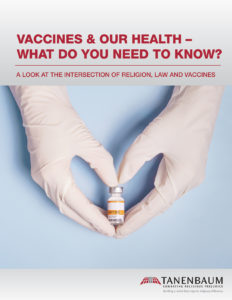Vaccines and Our Health:
What do you need to know?

The COVID-19 pandemic has once again brought the subject of vaccinations to the forefront of public discourse. Although vaccinations have long been successful in combating serious illnesses and in some cases almost eliminating them completely (such as smallpox and polio), they still remain the subject of much debate and confusion.
In order to provide an alternative to the rampant misinformation campaigns, Tanenbaum has put together a resource exploring common misconceptions about vaccinations and offering answers and information vetted by health experts and religious authorities. It is our hope that this resource will dispel some of the hesitancy and anxiety that affects many people throughout the United States.
There are a number of reasons why people may be hesitant to receive vaccines. These include mistrust of the government and regulating agencies that approve vaccines, pharmaceutical companies that produce vaccines, religious beliefs and concerns that may question the ethics of vaccines, and exposure to misinformation campaigns or, in some cases, a lack of concern about the viruses and diseases that vaccines prevent.
While it would be impossible to address each and every concern cited by the public, this resource explores these concerns and provides facts to mitigate fears, promote education, and combat widespread misinformation around vaccine production and use.
This resource also examines the history of vaccines in the United States in order to answer frequently asked questions that we have identified in regard to vaccines, such as:
- Are vaccines required by law?
- If so, where and why are they required?
- Are there exemptions available for people who may object to certain vaccines?
To learn the answers to these questions and more, please view our new resource:
Vaccines and Our Health: What do you need to know?